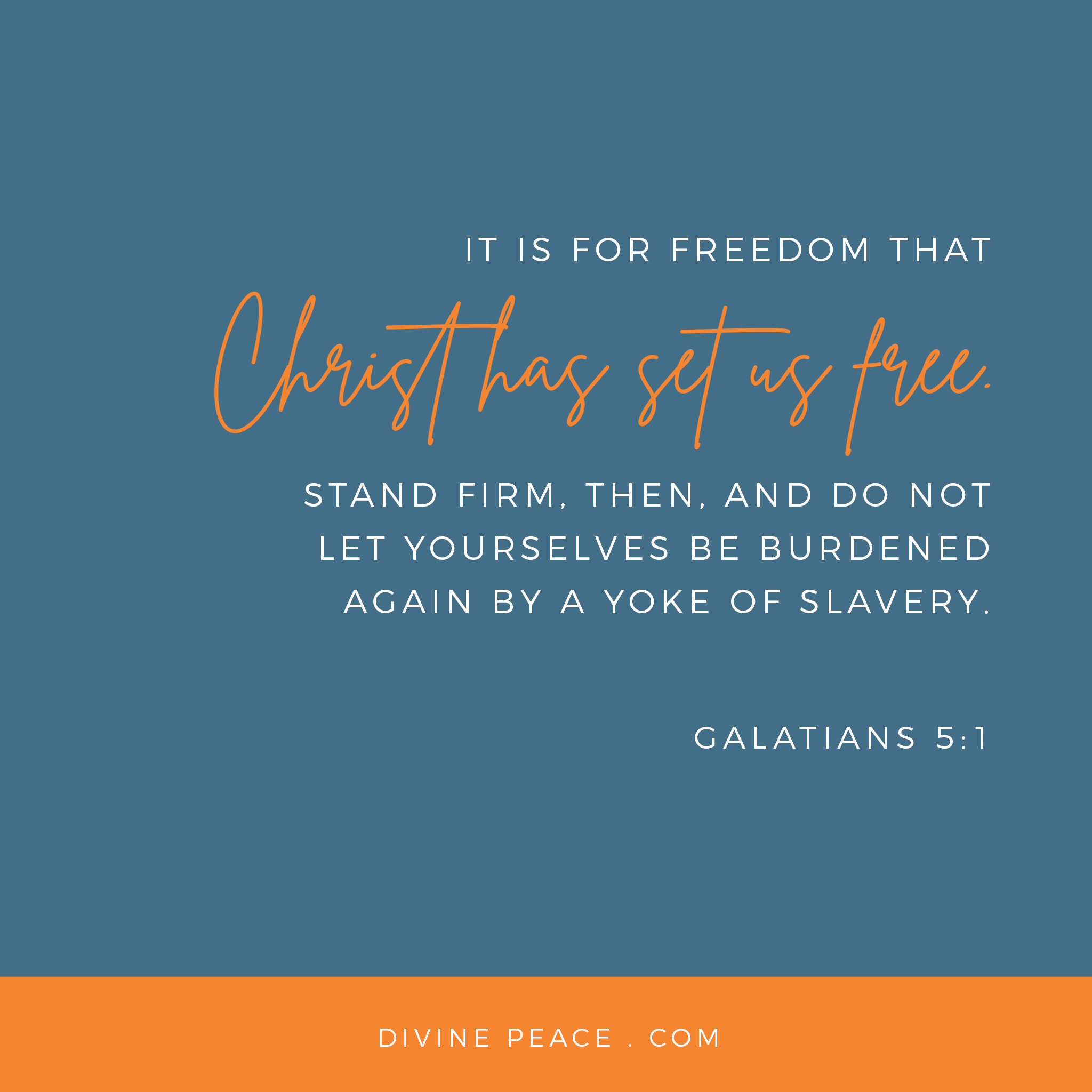July 21, 2019
Pastor Gunnar Ledermann
1 It is for freedom that Christ has set us free. Stand firm, then, and do not let yourselves be burdened again by a yoke of slavery.
13 You, my brothers and sisters, were called to be free. But do not use your freedom to indulge the flesh; rather, serve one another humbly in love. 14 For the entire law is fulfilled in keeping this one command: “Love your neighbor as yourself.” 15 If you bite and devour each other, watch out or you will be destroyed by each other.
16 So I say, walk by the Spirit, and you will not gratify the desires of the flesh. 17 For the flesh desires what is contrary to the Spirit, and the Spirit what is contrary to the flesh. They are in conflict with each other, so that you are not to do whatever you want. 18 But if you are led by the Spirit, you are not under the law.
19 The acts of the flesh are obvious: sexual immorality, impurity and debauchery; 20 idolatry and witchcraft; hatred, discord, jealousy, fits of rage, selfish ambition, dissensions, factions 21 and envy; drunkenness, orgies, and the like. I warn you, as I did before, that those who live like this will not inherit the kingdom of God.
22 But the fruit of the Spirit is love, joy, peace, forbearance, kindness, goodness, faithfulness, 23 gentleness and self-control. Against such things there is no law. 24 Those who belong to Christ Jesus have crucified the flesh with its passions and desires. 25 Since we live by the Spirit, let us keep in step with the Spirit.
Galatians 5:1,13-25
How have you spent your summer? We are about half way through summer, and I want you to ask yourself if you feel like you have wasted it, worked through it or enjoyed it. Summer means more freedom for most of us, but we don’t always enjoy that freedom. In our reading today from Galatians 5, Paul reminded the Galatian Christians that Christ set them free from sin for freedom in the Spirit, not to run back to the slavery of sin. You also face the temptation to run back to the slavery of sin, even though Christ has freed you to walk by the Spirit.
In his letter to the Galatians, Paul reminded his brothers and sisters in Christ that they were free. For Paul to give the Galatians the good news that they were free, he also had to clarify what had kept them from being free. The two things keeping the Galatians from freedom were the law and sin. On the one hand, the Galatian Jews were rejecting the freedom of Christ because they were still trying to be justified by the law. In other words, they believed they needed to do the right things so that God would accept them, which isn’t possible for any of us to do like David said in Psalm 51:5, “Surely I was sinful at birth, sinful from the time my mother conceived me.” And, like James said in James 2:10, “For whoever keeps the whole law and yet stumbles at just one point is guilty of breaking all of it.” The Galatians needed to hear that the law is not freedom, nor can it save. Instead, Paul explained how a person is saved in Galatians 3:26, “So in Christ Jesus you are all children of God through faith, 27 for all of you who were baptized into Christ have clothed yourselves with Christ.” For those who were lost in the law, Paul shared with them the freedom of Christ by faith.
On the other hand, Paul had to address those who were rejecting freedom in Christ because they were slaves to sin. This group of Galatians did not know God’s laws and were living according to their sinful flesh. In other words, they believed they could do whatever they want and suffer no consequences. Paul had to remind them that what people naturally want to do is no longer good 17 For the flesh desires what is contrary to the Spirit, and the Spirit what is contrary to the flesh. They are in conflict with each other, so that you are not to do whatever you want. From the time Adam and Eve fell into sin, all people have inherited the sinful nature and as a result are enslaved to sin. And, the prophet Ezekiel wrote, Ezekiel 18:20 “The one who sins is the one who will die.” Whether the Galatians were lost to the law or enslaved by sin, they both needed the same freedom only found in Christ.
By the time Paul reached chapter five in his letter to the Galatians, he had covered how Christ freed all people from the law, sin and death. Especially, in chapters three and four, Paul wrote how Jesus saved all people. In Galatians 4:4-5, Paul wrote, 4 “But when the set time had fully come, God sent his Son, born of a woman, born under the law, 5 to redeem those under the law, that we might receive adoption to sonship.” Jesus became one of us, having the same requirements of God to keep his whole law and being subject to the same temptations of sin. However, Jesus did not break the law or give into sin, so that he could redeem us. When the Bible says that Jesus redeemed us, it means that he traded his perfect life for our sinful lives. This trade happened when Jesus died for us. Jesus died for us so that now, all the times we break God’s law, all the times we sin and the death we deserve for our sin no longer affect us. Instead, God adopted us as his own children. Paul told the Galatians this has been done for them by God to free them from death and give them life. This is the message Paul founded his beginning to Galatians 5 on saying, 1 “It is for freedom that Christ has set us free.” Paul shared the good news of freedom in Christ, and then he continued with a response to the question all believers ask themselves once they are free, “Now that I am free in Christ, what do I do?” Paul followed up with Stand firm, then, and do not let yourselves be burdened again by a yoke of slavery.”

Our gospel lesson from Luke 9 gives examples of what not to do in the freedom of Christ. The time had come for Jesus to begin his journey to Jerusalem to die on the cross and as he traveled, he sent his disciples ahead of him to get things ready in a Samaritan village. The people there did not welcome Jesus, so some of his disciples asked if they could call down fire from heaven on them. Jesus stopped them, reminding them that freedom in Christ does not mean we desire punishment for those who reject Christ, but that we have the same mindset of God that we hear about in 2 Peter 3:9, “The Lord is not slow in keeping his promise, as some understand slowness. Instead he is patient with you, not wanting anyone to perish, but everyone to come to repentance.” After correcting the disciples’ lack of love, a man asked Jesus if he can follow him and Jesus responded that he will have to give up having a home to follow him. Then Jesus asked another man to follow him, 59…But he replied, “Lord, first let me go and bury my father.” 60 Jesus said to him, “Let the dead bury their own dead, but you go and proclaim the kingdom of God.” Finally, one more said that he would follow Jesus, but first had to tell his family, “Goodbye.” And, 62 Jesus replied, “No one who puts a hand to the plow and looks back is fit for service in the kingdom of God.” These four interactions between Jesus and his followers reveal that following him means total commitment.
Total commitment to Jesus means freedom. Now, before we move on, we need to clarify that when Jesus responded to his disciples and those who wanted to be his followers in this specific context, he was not saying that everyone who follows him can’t live in a house or have contact with their family. Jesus’ overall point was commitment to him. Paul also called the freedom we have in Christ a total commitment. He said, 13 “You, my brothers and sisters, were called to be free. But do not use your freedom to indulge the flesh; rather, serve one another humbly in love.” The temptation we face as believers living in the freedom of Christ is to go back to living in sin and not love one another, under the idea that we can just run back to Christ for forgiveness. However, Paul wrote, 21 “…I warn you, as I did before, that those who live like this will not inherit the kingdom of God.” The question we asked earlier was, “Now that I am free in Christ, what do I do?” In light of what Paul has said, we can ask the question in a more specific way, “Now that I am free in Christ, how do I love and not indulge the flesh?”
Paul answered this question when he wrote, 18 “But if you are led by the Spirit, you are not under the law.” The only way to escape the hold of the law and sin in our lives is to put it to death. The total commitment God requires from us then is only achieved by Christ as Paul wrote, 24 “Those who belong to Christ Jesus have crucified the flesh with its passions and desires.” In Jesus, the requirements of the law and the sinful desires are left behind because they were put to death. After the cross, in Jesus’ resurrection and in his brining us to live by faith, the Spirit now leads us. In Psalm 51:10, David wrote, “Create in me a pure heart, O God, and renew a steadfast spirit within me. 11 Do not cast me from your presence or take your Holy Spirit from me.” When the Spirit leads us, we have a new heart with new desires to show love and reject the evil desires of our sinful flesh. Paul’s point to us then is that freedom in Christ is not only freedom from the punishment of sin, but also from giving into sin.
In our reading from Jonah 3, we see the Spirit’s work in the people of Nineveh to free them from sin. God sent his prophet Jonah to the city of Nineveh to tell them they were going to be destroyed for their wickedness. When Jonah’s message reached the king of Nineveh, he said, 8 “…Let everyone call urgently on God. Let them give up their evil ways and their violence. 9 Who knows? God may yet relent and with compassion turn from his fierce anger so that we will not perish.” The Holy Spirit worked through the message of Jonah to bring the people of Nineveh to repent and 10 When God saw what they did and how they turned from their evil ways, he relented and did not bring on them the destruction he had threatened. Led by the Spirit, the Ninevites turned from their sin to follow God.
When the Holy Spirit works in our hearts to walk in freedom, it is no longer described as work. When Paul listed out the many evil desires of the flesh, he called them 19 “The acts of the flesh.” The Greek word, ἔργα, Paul used is also often translated works. Sin robs us of our freedom in Christ and enslaves us to work. Paul’s description of walking by the Spirit is the opposite. Paul wrote, 22 “But the fruit of the Spirit is love, joy, peace, forbearance, kindness, goodness, faithfulness, 23 gentleness and self-control. Against such things there is no law.” When the Spirit worked faith in our hearts, he freed us from the punishment of sin and also from giving into sin. Walking by the Spirit means he produces the love we have for one another and for God. Walking by the Spirit is a life of thankfulness for the freedom Christ gave to us.
We are about half way through summer, and I wonder if you feel like you have wasted it, worked through it or enjoyed it. Summer means more freedom for most of us, but we don’t always enjoy that freedom. Summer can often feel like the freedom Paul talked to the Galatians about. Sometimes it feels like we have wasted Jesus’ forgiveness because we fall back into sin. Other times, we feel like we are working so hard to do the right thing, but it just isn’t good enough for God. Both of these are not what Christ’s freedom means. Jesus has done the work to free you from your sins. You are no longer enslaved to evil and you aren’t required to be good enough for God. You are free to enjoy the forgiveness Jesus won for you, to love one another and live at peace with God because Christ has freed you to walk by the Spirit. Amen.



